Russia This Week is a weekly review by the MEMRI Russian Media Studies Project, covering the latest Russia-related news and analysis from media in Russia, the Caucasus, Central Asia, and Eastern Europe.
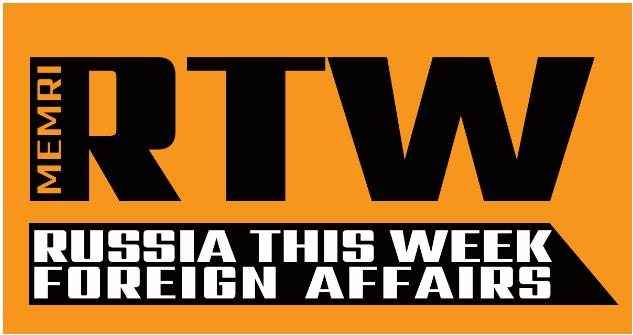
Photo Of The Week
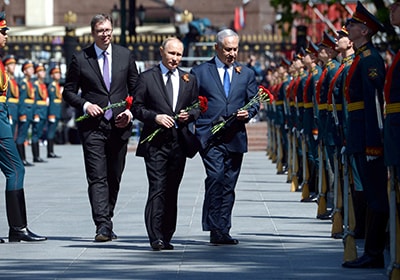
Russian President Vladimir Putin invited as guests of honor Israeli Prime Minister Benjamin Netanyahu, and Serbian President Aleksandar Vucic to attend the May 9 parade commemorating victory over Nazi Germany 73 years ago. (Source: Pmo.gov.il)
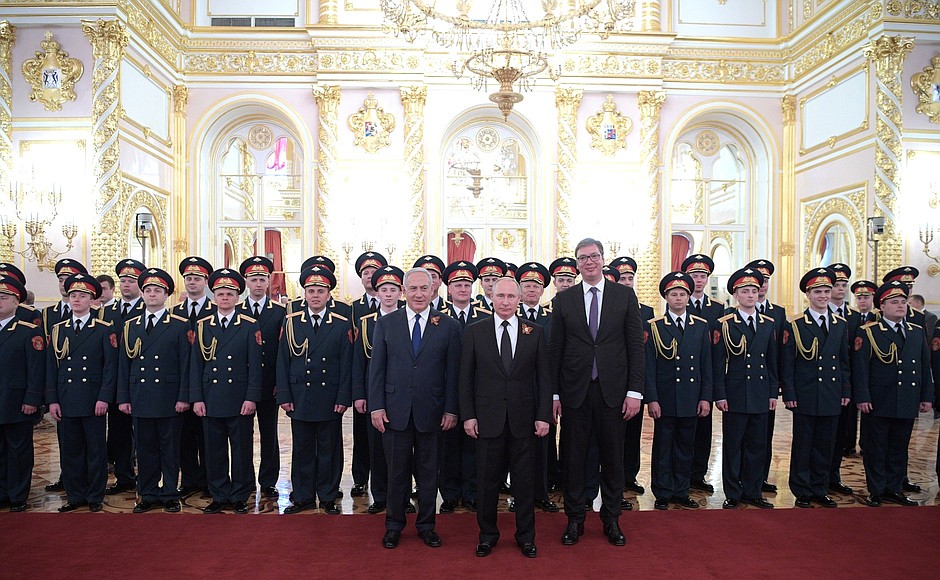
(Source: Kremlin.ru)

The military parade marking the 73rd anniversary of Victory in WWII. (Source: Kremlin.ru)
Putin Says

Putin speaking at the official reception to mark the 73rd anniversary of Victory in WWII. (Source: Kremlin.ru)
During his Victory Day speech in the Red Square, Putin said:
"War is always a challenge to life itself and to all the best it offers.
We remember the tragedies of the two world wars; the lessons of history do not let us 'go blind.'
"New threats bear the same old ugly features: selfishness and intolerance, aggressive nationalism and claims to exclusiveness.
"We are aware of the seriousness of these threats. It is important for all countries, all humankind to realize that peace is very fragile, and its stability is enhanced by our common commitment to hear, trust and respect each other."
(Kremlin.ru, May 9, 2018)
During the official reception to mark Victory Day, on May 9, Putin offered his thanks to the veterans of the Great Patriotic War:
"It is with deep emotion and filial gratitude that I want to address the veterans: we are proud of you, we salute your courage.
"You had one duty to fulfill and that was to protect your Motherland. You all overcame inhuman hardships. What children had to go through is poignant. Thousands of teenagers fought on the frontline or in guerrilla units, worked day and night on the home front, sacrificed all for Victory.
"It is your loyalty to the Motherland that has helped you overcome all the hardships and preserve human dignity both during the war and afterwards.
"You have always valued friendship and readiness to help one another. These are the qualities that have helped you in all your endeavors. Together, you restored the country, built cities, plants and factories, reclaimed virgin lands, made outstanding achievements in science, technology, and culture.
"Your lives are a great example of popular unity and service to the Motherland that you have set for us and for generations to come. We will always follow this example.
"We salute you."
(Kremlin.ru, May 9, 2018)
In The News:
Victory Day
The Russian news agency TASS in its report about the Victory Day parade emphasized Putin's warning against historical revisionism and the display of new sophisticated military hardware:
"Advanced weaponry rolled through Moscow’s Red Square as Russia celebrated the 73rd anniversary of the Soviet Union’s victory over Nazi Germany in the Great Patriotic War of 1941-1945.
"The parade was reviewed by Russian President, Supreme Commander-in-Chief Vladimir Putin.
"In his speech at the military parade on Red Square, the Russian leader stressed it was the Soviet Union that decided the outcome of World War II and Russia will resist attempts to deny this feat.
"'Today there are attempts to deny the feat of the people, which saved Europe and the world from slavery, from extermination and from the horrors of the Holocaust, and attempts to bury in oblivion the authenticity of the heroes, falsify, re-write and distort the entire history,' the Russian president said. 'We will never allow this,' Putin stressed.
SUPPORT OUR WORK

"The Victory Day parade was opened by 33 foot formations comprising over 13,000 servicemen marching across Red Square. They were followed by a mechanized column that included advanced Armata tanks, Kurganets infantry fighting vehicles, Bumerang armored personnel carriers and Koalitsiya-SV howitzers. For the first time ever, Terminator tank support combat vehicles, the Uran-9 combat multifunctional robotic system and the Uran-6 multipurpose mine-clearance robotic vehicle rolled through Red Square.
"The air component of the military parade was opened by the Mi-26 helicopter accompanied by four Mi-8AMTSh rotocraft. They were followed by Mi-28N, Ka-52 and Mi-24P helicopters.
"The parade’s flyover part also included Tu-160 strategic missile carriers, Tu-22M3 and Tu-95MS long-range bombers. The military transport aviation was represented by three Il-76MD aircraft and the Il-78 aerial refueling tanker that simulated mid-air refueling with a Tu-160 bomber.
"After the flyover of four MiG-29SMT light fighter jets, Su-24M frontline bombers, MiG-31BM interceptors and Su-34 fighter-bombers, a pair of Russia’s fifth-generation Su-57 planes flew over Red Square for the first time.
"The cutting-edge fighter jets were followed by Su-34, Su-30 and Su-35S aircraft.
"Six Su-25 ground attack planes that flew over Red Square traditionally emitted the smoke in the colors of the Russian flag. The air component of the military parade was concluded by the flyover of two MiG-31K fighter jets carrying the most advanced Kinzhal hypersonic missiles."
(Tass.com, May 9, 2018)
See the Victory Day Parade in pictures
Russia-Israel Relations
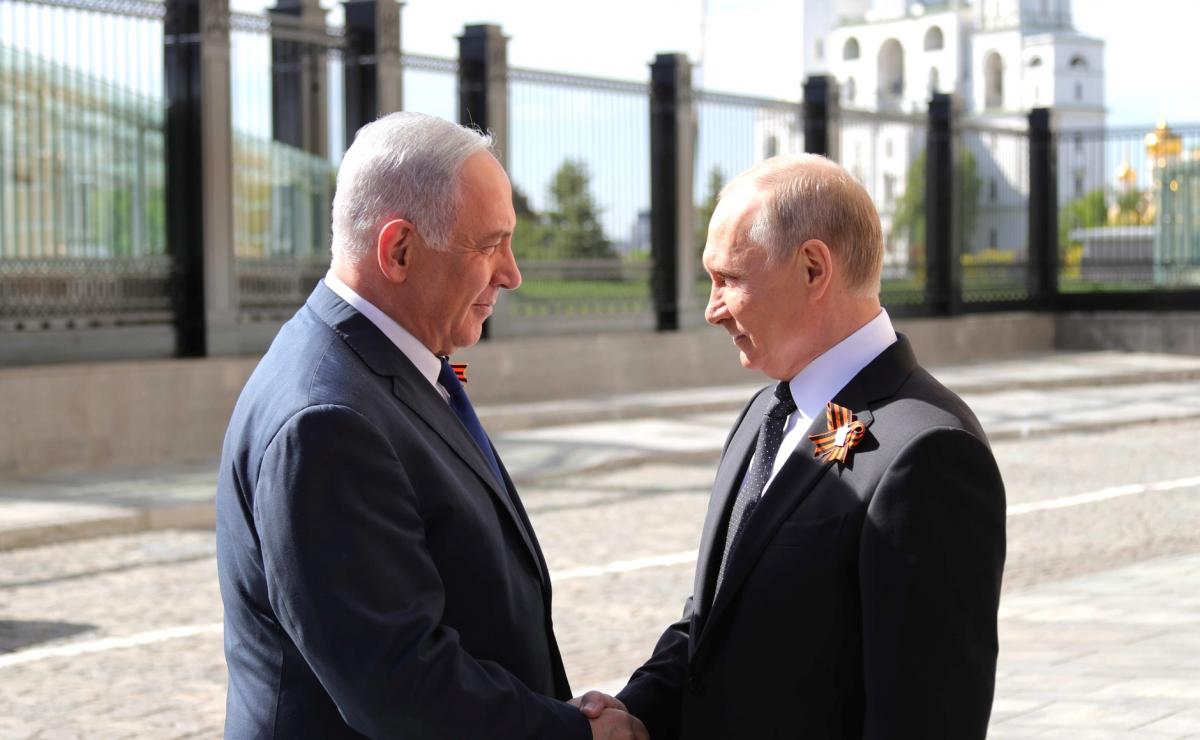
(Source: Kremlin.ru)
On May 9, Israeli Prime Minister Benjamin Netanyahu was a guest of honor in the Victory Day parade in Moscow.
During a meeting in Moscow, the two leaders discussed Victory Day and Iran. It is worth noting that on May 10, Israel repelled Iranian missile attack in the Golan Heights and launched a counterstrike against Iranian targets in Syria.
Putin said:
"Let me once again welcome you in Moscow. I would like to once again express my gratitude to you for finding it possible to visit Moscow on May 9, our Victory Day, the day we defeated fascism.
"We know how the Israelis, and Jewish people in general, relate to the events of the war. And this attitude unites us in many respects: our feelings about Nazism, Fascism, the victims of Nazism, in general, and of the Holocaust, in particular.
"As of this year, May 9 has become a national holiday in Israel, as we have learned. I remember my visit to Israel, which was connected with the opening of a monument to Soviet soldiers.
"Naturally, we will use your visit today to discuss bilateral relations and problems in the region. Unfortunately, the situation is very acute. I would like to express hope that you and I will not only manage to discuss, but also find solutions which will lead to a shift in the situation, and which will also allow us to find ways to resolve heated conflicts."
(Kremlin.ru, May 9, 2018)
Netanyahu stated in reply:
"Thank you Mr. President. It is difficult for me to describe to you the depth of my impression from that moving ceremony to mark the victory over Nazism.
"We in Israel do not forget for a moment the great sacrifice of the Russian people and the Red Army in the victory over the Nazi monster.
"Sitting next to me, between us, was a veteran who was among the liberators of Auschwitz. We will never forget the meaning of your sacrifice, of those soldiers, along with the half a million Jewish soldiers in the Red Army, in ensuring the fate of Russia, of humanity and of our people, the Jewish people.
"Neither do we forget the great lesson of the need to stand against a murderous ideology in time. It is unbelievable, but 73 years after the Holocaust, there is a country in the Middle East, Iran, that is calling for the destruction of anther six million Jews.
"The difference is that today we have a state and I very much appreciate the opportunity to discuss regional problems with you, the attempts as you put it, to resolve the crises, to lift the threats in a prudent and responsible manner.
"I conclude and say to you that I am very moved that you invited me to this parade as Prime Minister of Israel, as head of the state of the Jews, and you mentioned the Holocaust of the Jews today. This is additional testimony to the deep ties between our two peoples and I thank you for this."
(Pmo.gov.il, May 9, 2018)
Serbia-Russia Relations – Serbian President Vucic: Russia Has Always Supported Serbia In Times Of Trial
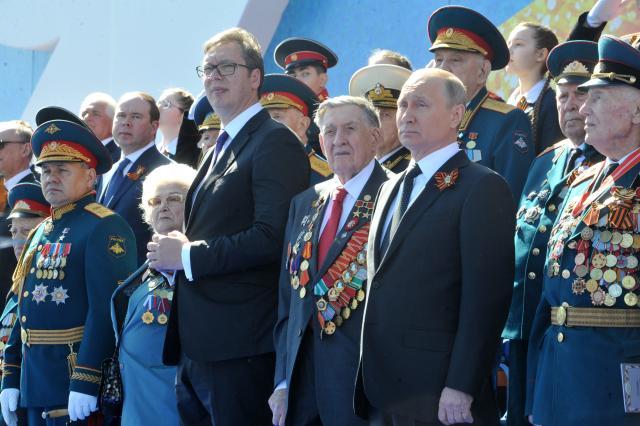
(Source: B92.net)
The Belgrade-based media outlet B92.net covered Serbian President Aleksandar Vucic's visit to Moscow to attend the May 9 Victory Day parade:
"[During a meeting with Putin] Vucic remarked that 'nothing is less enduring in international relations than gratitude' - pointing out that 'the Serbian people would never forget what you have done - you have protected Serbia's territorial integrity and sovereignty many times.'
"'I am happy to see you in Moscow again,' Putin told Vucic. 'The reason for our meeting this time is certainly important – both for Russia and Serbia. I am referring to the end of World War II or the Great Patriotic War, as it is called here.' 'Naturally, there are glorious pages of history in the historical memory of our people when Serbia and Russia were fighting together against a common enemy,' the Russian leader said.
"'This year we will celebrate the 180th anniversary of diplomatic relations between our states. Our trade is growing – last year it increased 23 per cent. I am very pleased that we have an opportunity to talk informally about the package items in our relations this evening,' Putin concluded.
"Serbia has demonstrated that it is a reliable partner to the Russian Federation and has never acted against the interests of your country when Russia was going through hard times, Vucic told Putin.
"He thanked the Russian president for the warm reception and congratulated him on his 'exceptional victory in the Russian presidential election,' wishing him 'every success in his work.'"
(B92.net, May 9, 2018)
Read More:
- Serbian Foreign Minister Ivica Dacic and the first deputy chairman of the Russian upper house's international affairs committee, Sergei Kislyak, discussed in Belgrade on Thursday relations between the two countries. (Tass.com, May 11, 2018; Read the full article)
Armenia Relations
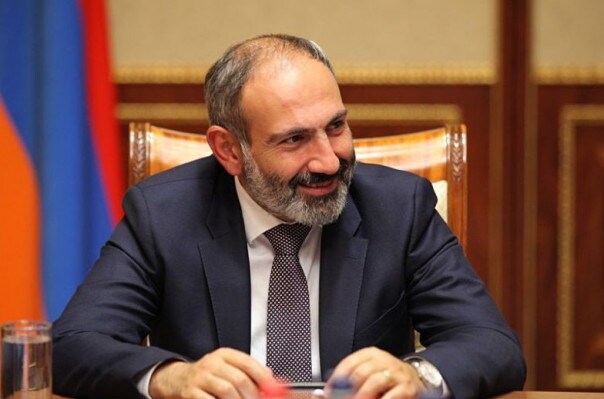
Newly appointed Armenian PM Nikol Pashinyan (Source: Tert.am)
In an article, titled "Why Hopes To Repeat Yerevan In Moscow Will Be Disappointed," Armenian-born Russian politologist Andranik Migranyan discussed the political situation in Armenia and Russia.
Armenian Prime Minister Serzh Sargsyan resigned on April 23, after ten days of opposition protests. He was reelected prime minister of Armenia in April 2018. However, after six days after taking office, large protests started in the country. Sargsyan said: "The situation could be solved in various ways, but I will not resort to any of them. That is not mine. I leave the post of the head of this country." Two weeks after Sargsyan resigned, Armenia's parliament has elected opposition leader Nikol Pashinyan as the new prime minister.
Migranyan described Pashinyan as "a crowd-pandering demagogue", who used the protests to achieve "his own ambitious goals." Migranyan continued stating that Pashinyan raised hopes in "the anti-system opposition" in Russia However, according to the Armenian-born politologist the political situations in Armenia and Russia are divided by "colossal qualitative differences."
Below are excerpts of Migranyan's article published in RIA:
"Mass protests in Yerevan against Serzh Sargsyan's ascendancy to prime minister, his resignation under the pressure of the street, and the current attempts to appoint Nikol Pashinyan — a crowd-pandering demagogue – who used the protests to achieve his own ambitious goals to this post, have raised hopes in the anti-system opposition in Russia. Hopes that they would be capable of reproducing in Russia what happened in Armenia. With this purpose, they are planning to organize mass rallies both in Moscow and all over the country on May 5— in fact, on the eve of Putin's inauguration.
Since I have first-hand knowledge of the political situation both in Russia and in Armenia (over the past thirty years I have observed, studied and analysed political processes in both countries from the inside, as a participant), I'd like to warn excessively impressionable supporters of 'velvet' and other exotic revolutions: there are colossal qualitative differences between the political situations in Armenia and Russia.
"Firstly, the Armenian authorities have not managed to stop a significant out migration over the past nearly thirty years. This process can be observed everywhere in the post-Soviet space, but is especially felt in Armenia. The country is in economic blockade and is in a state of war with Azerbaijan over Nagorno-Karabakh. No solution to this problem is expected in the foreseeable future, and therefore many vote with their feet and leave elsewhere in a quest for sustenance, safety and future for their children. The situation is exacerbated by the fact that no demand exists for the factories, research institutes, laboratories and other national economic assets inherited from the Soviet Union — they were closed or turned into warehouses. The new economy in the IT sphere is a work in progress. Huge budget sums are spent on the army, hefty by the standards of this small country, which is intended to ensure the safety of Armenia and Nagorno-Karabakh. And last but not least — features characteristic of all post-Soviet states: corruption, nepotism, monopolies that stifle small and medium-sized businesses…
"A short time ago, I visited two of the most well-to-do former Soviet republics — Estonia and Lithuania. My visit coincided with the start of mass rallies in Yerevan. During my public speeches, I was asked about the reasons for mass rallies. I explained: many factories are closed in the country, people cannot find work, the country is under siege, people are dissatisfied, and those who are still there have accumulated a lot of anger and frustration. My listeners noted that, although Lithuania and Estonia are not under siege or at war, their industry has disappeared almost completely too; there are no jobs and young people leave en masse for the Western European countries. Even though both countries are members of the European Union and NATO. This cannot serve as consolation for the Armenians who have taken to the streets; it is a testimony to the fact that all former Soviet republics experience huge negative consequences of the collapse of the USSR, and it will take long before they are capable of coping with these consequences. This is a fact, whatever may be said by professional demagogues and populists who think that all problems will be solved as soon as they are given power.
"Secondly, even though many of the negative moments of life in Armenia are also present in the economic and socio-political life of Russia, major changes have taken place over the years of Putin's presidency – and not only in socio-economic but in the political sphere and in the public mood as well. On the eve of the previous presidential election in Russia, many thought that popular support for the authorities only existed on paper, not in real life, and that state institutions of power and the elite were very amorphous and ineffective. The first mass anti-Putin protests created a mistaken impression in the masses that if one could but apply a bit more pressure and the powers that be would collapse. And the crowd from Bolotnaya Square and Sakharov Avenue would bring their leaders to the Kremlin and crown them. But just at that moment it turned out that the Russian authorities and the society were in a fundamentally different state than in Georgia, Ukraine, and other countries where the crowd tried to seize power bypassing the laws. It turned out that the power structures were so effective that they did not allow the crowd to capture central squares and block the work of government agencies. Moreover, the authorities countered thousands of anti-establishment protesters with even more grand-scale rallies of their supporters. It meant that the non-system opposition lost the fight for the street.
"The overwhelming majority of both the power institutions and the elite groups supported Putin. All this happened a few years before Crimea, when pro-Western liberals still had quite a strong presence in the mass media and were very aggressive. After Crimea, Donbas and Syria, patriotic sentiments have become dominant both in the political sphere and in the mass media, and the authorities are widely supported, which was demonstrated during the March presidential election. And the last reason why any attempts to pressure Putin in order to disrupt the inauguration and seize power are much more ephemeral today than in 2012: it is obvious that today, institutions of power are more consolidated. With all the external sanctions, what we observe is not discord but consolidation of the people and the power, the elites and the power
"Nobody can accurately say how long it will last, but it is a fact for the foreseeable future. Never have pro-Western liberals and anti-Putin activists occupied such a marginal position in mass media as today. It used to be thought that if you are intelligent, educated, 'handshakeable' — you must be against the authorities in Russia and against Russia itself in the global sense of the word. Today, pro-Western liberals are losing their influence on the society, but not because they are not allowed to appear on central TV channels. They are losing because many intelligent, talented intellectuals consider it an honour to defend the authorities and the values of their country in a global confrontation both with internal and external opponents.
"And one last thing: the defeat of the authorities in Yerevan can be explained by the fact that, in contrast to Russia, the authorities there failed to mobilize their supporters on a broader scale, failed to wrest the streets and the squares from the crowd led by demagogues, failed to consolidate the elites. As a result, their former companions joined the leader of the masses.
"And what's most important, the Armenian authorities completely lost the information fight. Pro-establishment mass media proved to be quite weak and toothless, as well as intellectually inept. Just like the organizers and managers of these pro-authority mass media."
(Ria.ru, May 5, 2018)
News In Brief
- Vladimir Putin sent his greetings to the Jewish community of Russia on the 26th day of Iyar, the Day of Salvation and Liberation. (Kremlin.ru, May 10, 2018; Read the full statement)
- Czech president sees nothing wrong in attending Victory Day ceremony at Russian embassy (Tass.com, May 11, 2018; Read the full article)
- Vladimir Putin sent his greetings to the participants in the 10th International Economic Summit Russia — the Islamic World: KazanSummit 2018, held in Kazan on May 10–12, 2018. (Kremlin.ru, May 10, 2018; Read the full statement)




